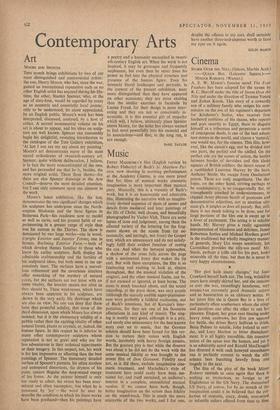Music
ERNST MARISCHKA'S film (English version by Robert Flaherty) of Bach's St. Matthew Pas- sion, now showing in morning performances at the Academy Cinema, is one more proof that for films of musical works cinematic imagination is more important than musical piety. Musically, this is a travesty of Bach's work, but it is an honourable and admirable film, illustrating the narrative with an imagina- tively devised sequence of shots of scenes and details from medimval and later paintings of the life of Christ, well chosen, and beautifully photographed by Vaclav Vich. There are some lapses of taste and judgement, among them the affected variety of the lettering for the frag- ments shown on the screen from (or oc- casionally, and jarringly, not from) the Gospel text, which are unnecessary and do not satisfy- ingly fulfil their evident function of resting the eye. And when the betrayal approaches, a shadow of the cross falls across the page with a sentimental irony that makes the lip curl. But with these exceptions, the film is so fascinating and exciting to look at, almost throughout, that the musical violation of the original, and the other musical faults, can be, if not excused or ignored, at least borne. The score is much knocked about, and the sound recording, at the press show, was very erratic (although the scarcely audible super-pianississi- mos were probably a faithful realisation, not of Bach's intentions, but of Karajan's inter- pretation, for they are one of his favourite affectations in any kind of music). The sing- ing is mostly very good, although it is a pity, and surely also unnecessary for the best-known story ever set to music, that the German soloists should have been forced for this ver- sion to torture their voices with English words, inevitably with heavy foreign accents. But the greatest pity is that while the director was about it he did not do the work with the same- musical fidelity as was brought to the recent film of Don Giovanni. Fidelity need not, as it did there, exclude imaginative cine- matic treatment, and Marischka's style of treatment here could easily have been sus- tained for, and itself sustained, an audience's interest in a complete, unmutilated musical version. It'. we cannot have both, though, better imagination on the screen than fidelity on the sound-track. This is much the more enjoyable of the two works,.and I for one,
despite the offence to my cars, shall certainly have another three-and-sixpence worth to feast my eyes on it again.
COLIN MASON


































 Previous page
Previous page